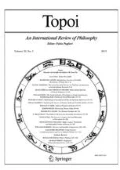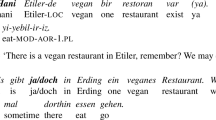Abstract
This paper follows up a suggestion by Paul Vincent Spade that there were two Medieval theories of the modes of personal supposition. I suggest that early work by Sherwood and others was a study of quantifiers: their semantics and the effects of context on inferences that can be made from quantified terms. Later, in the hands of Burley and others, it changed into a study of something else, a study of what I call global quantificational effect. For example, although the quantifier in ‘¬∀xPx’ is universal, it can be seen globally as having an existential effect; this is because the formula containing it is equivalent to ‘∃x¬Px’. The notion of global effect can be explained in terms of the modern theory of normal forms. I suggest that early authors were studying quantifiers, and the terminology of the theory of personal supposition is a classification of kinds of quantifiers. In this theory, to say that a term has distributive supposition is to say, roughly, that it is quantified by a universal quantifying sign. Later authors turned this into a theory of global quantificational effect. In the later theory, to say that a term has distributive supposition is to say that the overall effect is as if the term were universally quantified with a quantifier taking (relatively) wide scope. The difference between these two approaches is illustrated by the fact that the term ‘man’ is classified as having distributive ("universal") supposition in ‘Not every man is running’ in the earlier theory, whereas in the later theory that term does not have distributive supposition; it has determinate ("existential") supposition. In the paper I explain these options, and I argue from several texts that the earlier and later medieval theories actually worked like this. In an appendix I make further efforts to clarify the obscure early accounts, as well as the nineteenth century "doctrine of distribution". The last section of the paper discusses the "purpose(s)" of supposition theory.
Similar content being viewed by others
References
Barney, Stephen, Lewis, Wendy, Normore, Calvin and Parsons, Terence (trans.): 1997, ‘On the Properties of Discourse’, this volume. Translation of the first two-thirds of ‘Tractatus de Proprietatibus Sermonum’, in de Rijk, 703–730.
Buridan, John. 14th century: 1957, ‘Tractatus de Suppositionibus’ in Reina, Maria Elena (Ed.), Giovanni Buridano: Tractatus de Suppositionibus, Rivista critica di storia della filosofia, 175–208. Translated in King, 1985.
Buridan, John. 14th century: 1976, ‘Tractatus de Consequentiis’ in Hubien, Hubert (Ed.), Iohannis Buridani tractatus de consequentiis: Édition critique, Volume XVI of Philosophes médiévaux, Université de Louvain. Translated in King, 1985.
Burley, Walter. 14th century: 1972, ‘De Suppositionibus’ in Brown, Stephen (Ed.), Walter Burleigh's Treatise De Suppositionibus and Its Influence on William of Ockham, Franciscan Studies 32, 15–64. Translated in this volume in Spade, 1997.
Burley, Walter. 14th century: 1955, in Philotheus Boehner (Ed), Walter Burleigh: De puritate artis logicae tractatus longior, with a Revised Edition of the Tractatus brevior, St Bonaventure, NY: The Franciscan Institute. Translated in Spade [forthcoming].
De Rijk, L. M.: 1967, Logica Modernorum, Volume II Part 2. Assen, The Netherlands: Koninklijke Van Gorcum & Company N.V.
Dinneen, Francis P.: 1990, Peter of Spain: Language in Dispute, Amsterdam/Philadelphia: John Benjamins Publishing Company.
Geach, Peter: 1956, ‘The Doctrine of Distribution’, Mind, 67–74.
Geach, Peter: 1962, Reference and Generality, Ithaca, New York: Cornell University Press.
Geach, Peter: 1972, ‘History of a Fallacy’, in Logic Matters, Oxford: Blackwell, pp. 1–13.
Geach, Peter: 1976, ‘Distribution and Suppositio’, Mind 85, 432–435.
Karger, Elizabeth: 1993, ‘A Theory of Immediate Inferences Contained in Buridan's Logic’ in Klaus Jacobi (Ed.), Argumentationstheorie: Scholastic Forschungen zu den logischen une semantischen Regeln korrekten Folgerns, Leiden-New York-Köln: E.J. Brill, pp. 407–429.
King, Peter: 1985, Jean Buridan's Logic: The Treatise on Supposition, The Treatise on Consequences, Dordrecht: D. Reidel.
Kretzmann, Norman: 1966, William of Sherwood's Introduction to Logic, Minneapolis: University of Minnesota Press.
Kretzmann, Norman: 1968, William of Sherwood's Treatise on Syncategorematic Words, Minneapolis: University of Minnesota Press.
Kretzmann, Norman and Stump, Eleonore: 1988, The Cambridge Translations of Medieval Philosophical Texts Volume 1, Cambridge: Cambridge University Press.
Lambert of Auxerre. 14th century: 1971, Properties of Terms. Logica (Summa Lamberti), ed. Franco Alessio; VIII: De suppositionibus et de significationibus, Florence: Le Nuova Italia, pp. 205045. Translated in Kretzmann and Stump, 1988.
Mates, Benson: 1972, Elementary Logic, N.Y.: Oxford University Press.
Matthews, Gareth: 1997, ‘Two Theories of Supposition?’, this volume.
Ockham, William. 14th Century. Summa Logicae.
Paul of Venice. 14th century: 1970, Logica Parva (1472 edition), Venice. Reprinted by Georg Olms Verlag, Hildesheim/New York. Translated in Perreiah, 1984.
Perreiah, Alan: 1984, Logica Parva: Translation of the 1472 Edition, München: Philosophia Verlag.
Peter of Spain. 13th century: 1972, Tractatus: Summulae Logicales. De Rijk, L. M. (Ed.). Assen: Van Gorcum. Translated in Dinneen, 1990.
Read, Stephen: 1991, ‘Thomas Cleves and Collective Supposition’, Vivarium XXIX, 50–84.
Spade, Paul Vincent: 1988, ‘The Logic of the Categorical: The Medieval Theory of Descent and Ascent’ in Norman Kretzmann (Ed.), Meaning and Inference in Medieval Philosophy, Dordrecht: Kluwer, pp. 187–224.
Spade, Paul Vincent: 1997, Translation of the beginning of Walter Burley's Treatise on the Kinds of Supposition (De Suppositionibus), translated from Brown, Stephen, “Walter Burleigh's Treatise De Suppositionibus and Its Influence on William of Ockham,”Franciscan Studies 32, 1972, 15–64. This volume.
Spade, Paul Vincent: forthcoming, Translation of Walter Burley's The Longer Treatise on the Purity of the Art of Logic, Tract 1: ‘On the Properties of Terms’. Translation of the second Burley item above.
Whately, Richard: 1975, Elements of Logic, Delmar, N.Y.: Scholar's Facsimiles & Reprints (Reprint of the 1827 edition.)
William of Sherwood. 13th century: 1937, Introductiones in logicam. Grabman, Martin (Ed.). Sitzungsberichte der Bayersichen Akademie der Wissenschaften, Philosophisch-historische Abteilung, Jahrgang, 1937, H. 10. Munich. Translated in Kretzmann, 1966.
William of Sherwood. 13th century: 1941, ‘Syncategoremata’ in O'Donnell, J. R. (Ed.). Mediaeval Studies III, 46–93. Toronto: Pontifical Institute of Mediaeval Studies, 1941. Translated in Kretzmann, 1968.
Author information
Authors and Affiliations
Rights and permissions
About this article
Cite this article
Parsons, T. Supposition as Quantification versus Supposition as Global Quantificational Effect. Topoi 16, 41–63 (1997). https://doi.org/10.1023/A:1005715802934
Issue Date:
DOI: https://doi.org/10.1023/A:1005715802934



